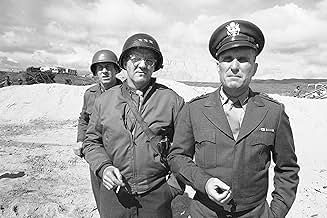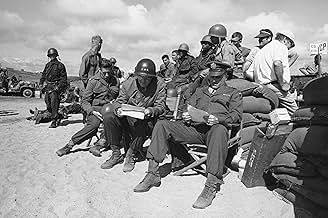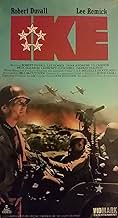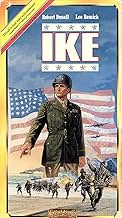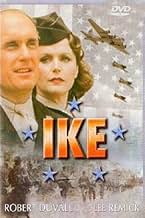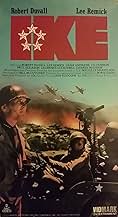अपनी भाषा में प्लॉट जोड़ेंDuring World War II, General Dwight D. "Ike" Eisenhower serves as supreme commander of the Allied Expeditionary Force in Western Europe. On a personal level, he has an extramarital affair wi... सभी पढ़ेंDuring World War II, General Dwight D. "Ike" Eisenhower serves as supreme commander of the Allied Expeditionary Force in Western Europe. On a personal level, he has an extramarital affair with his driver Kay Summersby.During World War II, General Dwight D. "Ike" Eisenhower serves as supreme commander of the Allied Expeditionary Force in Western Europe. On a personal level, he has an extramarital affair with his driver Kay Summersby.
- 5 प्राइमटाइम एमी के लिए नामांकित
- 1 जीत और कुल 5 नामांकन
एपिसोड ब्राउज़ करें
कहानी
क्या आपको पता है
- ट्रिवियाHistorical sources for the movie included official files of the United States Army; the Office of the Chief of Military History; the National Archives; public records and documents, and "Past Remembering: My Love Affair with Dwight D. Eisenhower" by Kay Summersby (as Kay Summersby Morgan).
- गूफ़Immediately following the scene where Ike (Robert Duvall), traveling with General George S. Patton (portrayed by Darren McGavin), in Patton's command car, steps out of the car, and is seen physically taking a step across the German border, after saying "It's been a long, long time since an Eisenhower returned to Germany," an on screen caption states "Ohrdruf, Germany April 13, 1944." Ohrdruf is a small town in south central Germany, the infamous site of the Ohrdruf forced labor and concentration camp, a subcamp of the Buchenwald concentration camp, and famously was the first concentration camp liberated by U.S. troops, specifically the 4th Armored Division of Patton's Third Army, and was visited in person by Eisenhower, Patton, and Omar Bradley April 12-13, 1945. This was ten months and six days after D-Day (June 6, 1944). The on-screen caption is correct as to the location, but incorrect as to the date, since it could not have happened on April 13, 1944, which would have been almost two months before D-Day.
- कनेक्शनEdited into Ike: The War Years (1979)
फीचर्ड रिव्यू
We can't quite tell whether this film is meant to be a love-story against a war background, or a war-story with a romantic sub-plot. The two themes appear to compete for dominance, rather to its cost.
The two star-roles are General Dwight D. Eisenhower and his English (actually Irish) driver and secretary Kay Summersby, who were the subject of rumours that remain unconfirmed to this day. Her memoirs were as discreet and unrevealing as you would expect in 1948, before the war propaganda had had time to wear-off, especially as Ike was still alive. But after his death, she started writing a new version called 'Past Forgetting', apparently wanting to correct the record before she herself succumbed to cancer. The trouble was that her mind was going, and the story had to be finished by a ghost writer. How much was truth, and how much was catchpenny fiction, we can't tell. But as for "Did they, didn't they?", the answer seems to be "They wanted to, but didn't... quite."
The film appears to make a vague reference to the non-event, when Ike says "I was about to make a damn fool of myself. Call it battle fatigue." Perhaps we can take this as a code for "I did make a damn fool of myself".
Either way, there is no doubting the depth of feeling on both sides, and in a rather contrived farewell scene where the two of them are watching Noël Coward and Gertrude Lawrence singing 'I'll see you again' (featuring the lines 'Time may lie heavy between/But what has been/Is past forgetting'), the emotional force is powerful indeed.
Their touching personal story, however, is rather too drowned-out by endless stock footage of D-Day and the Normandy campaign. Still, their performances are masterly, Robert Duvall big and confident, and Lee Remick surprising us with her realistic English accent. Of the rest of the cast, Ian Richardson looks fully mad enough to be Montgomery, but replicates his accent so convincingly that it can actually sound a little too like mimicking, and Vernon Dobtcheff makes a suitably lofty and chilly De Gaulle.
The dialogue by Melville Shavelson is the best from any war film of its kind. When Monty asks Ike not to smoke, he adds "Is that an unreasonable request?", and Ike replies "No, it's the only reasonable remark you've made all morning." George Patton had famously declared "Brave men don't cry" to excuse the slapping of a teenage soldier in Sicily. When Ike forgives him and offers him command of the Third Army, it's Patton's turn to weep with emotion, and Ike gently reminds him "You see? Brave men do cry." So it comes as a let-down when Ike is made to say "For starters...", an irritating 70's cliché. Monty is referenced as Lieutenant-General, when he'd been a full General for some months. And dialogue apart, the scene where Ike visits Belsen in May 1945 is confusingly (and jarringly) captioned 1944.
The two star-roles are General Dwight D. Eisenhower and his English (actually Irish) driver and secretary Kay Summersby, who were the subject of rumours that remain unconfirmed to this day. Her memoirs were as discreet and unrevealing as you would expect in 1948, before the war propaganda had had time to wear-off, especially as Ike was still alive. But after his death, she started writing a new version called 'Past Forgetting', apparently wanting to correct the record before she herself succumbed to cancer. The trouble was that her mind was going, and the story had to be finished by a ghost writer. How much was truth, and how much was catchpenny fiction, we can't tell. But as for "Did they, didn't they?", the answer seems to be "They wanted to, but didn't... quite."
The film appears to make a vague reference to the non-event, when Ike says "I was about to make a damn fool of myself. Call it battle fatigue." Perhaps we can take this as a code for "I did make a damn fool of myself".
Either way, there is no doubting the depth of feeling on both sides, and in a rather contrived farewell scene where the two of them are watching Noël Coward and Gertrude Lawrence singing 'I'll see you again' (featuring the lines 'Time may lie heavy between/But what has been/Is past forgetting'), the emotional force is powerful indeed.
Their touching personal story, however, is rather too drowned-out by endless stock footage of D-Day and the Normandy campaign. Still, their performances are masterly, Robert Duvall big and confident, and Lee Remick surprising us with her realistic English accent. Of the rest of the cast, Ian Richardson looks fully mad enough to be Montgomery, but replicates his accent so convincingly that it can actually sound a little too like mimicking, and Vernon Dobtcheff makes a suitably lofty and chilly De Gaulle.
The dialogue by Melville Shavelson is the best from any war film of its kind. When Monty asks Ike not to smoke, he adds "Is that an unreasonable request?", and Ike replies "No, it's the only reasonable remark you've made all morning." George Patton had famously declared "Brave men don't cry" to excuse the slapping of a teenage soldier in Sicily. When Ike forgives him and offers him command of the Third Army, it's Patton's turn to weep with emotion, and Ike gently reminds him "You see? Brave men do cry." So it comes as a let-down when Ike is made to say "For starters...", an irritating 70's cliché. Monty is referenced as Lieutenant-General, when he'd been a full General for some months. And dialogue apart, the scene where Ike visits Belsen in May 1945 is confusingly (and jarringly) captioned 1944.
- Goingbegging
- 29 मार्च 2019
- परमालिंक
टॉप पसंद
रेटिंग देने के लिए साइन-इन करें और वैयक्तिकृत सुझावों के लिए वॉचलिस्ट करें
- How many seasons does Ike: The War Years have?Alexa द्वारा संचालित
विवरण
इस पेज में योगदान दें
किसी बदलाव का सुझाव दें या अनुपलब्ध कॉन्टेंट जोड़ें


